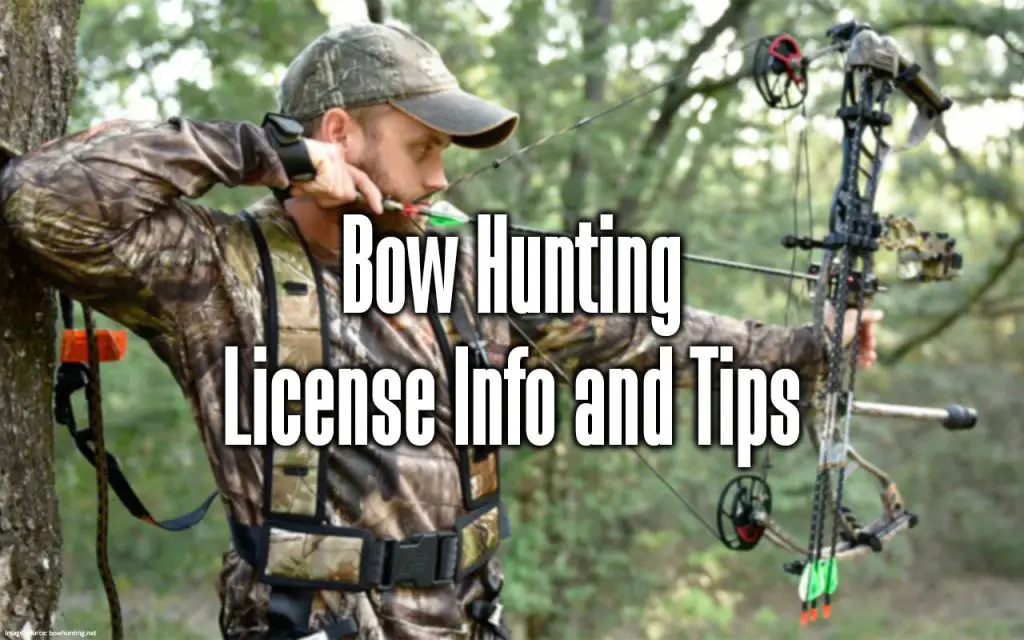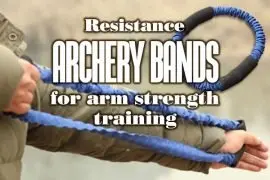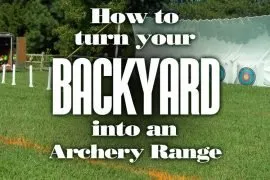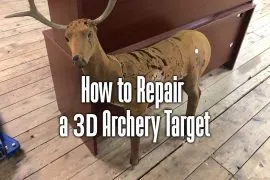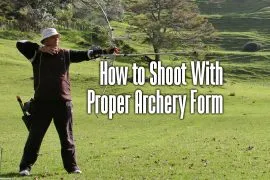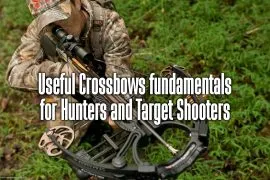It’s fine. We’ve all been there. It’s complicated, and some states offer dozens of different sorts of hunting licenses to purchase, so figuring things out can be quite time-consuming.
We’re here to help, as always, and this essay is our no-nonsense guide for beginning bow hunters wanting to get their first bow hunting license. We’ll explain a few of the lingo you’ll encounter on your state’s Bow Hunting License page, some of the ideas you’ll need to grasp, and hopefully “de-mystify” the procedure.
We’ll tell you how to acquire your Bow Hunting License, but not how to do it. Each state has a distinct licensing procedure that you’ll have to follow, and we won’t go into detail about it since doing so would be deceiving. Hopefully, this post will answer all of your questions regarding the licensing process and how to get through it.
Let’s begin at the beginning:
Your state issues hunting licenses
Table of Contents
While there are several federal regulations pertaining to hunting, state governments issue hunting licenses and rules, the terms and conditions that define how you may hunt are determined by your state governments.
Because each state has different terrain and climate and a distinct population of deer, elk, bear, coyote, and so on, each state issues hunting licenses according to its own rules.
In most states, the procedure is similar
Although it may seem to be complicated at first. Simply put, you’ll need to:
- Determine the type of license you wish to acquire.
- Determine whether you need any more permits.
- Take and pass a hunter education classes in your state (and we’ll get into that later).
- You’ll need to acquire a hunting license or permit;
- Provide identification (often a valid driver’s license) and all essential personal information.
You can usually go to either a license issuing agent location (usually an outfitter/camping store/something like that) or online or by phone to obtain your real license. If you get your license online or by phone, there’s generally a waiting period; you can usually walk out with the document if you pick up your license at an issuing location.
What Are Those “Further Permits”?
Every state is unique, but many states have a basic hunting license that you must acquire in addition to specialized permits to hunt various sorts of games and utilize different weapons.
Here’s an example of how different sorts of games may be classified: a New York state hunter’s license allows you to hunt one deer and one bear when we wrote this article. However, if you wanted to hunt for turkeys, you would require a separate turkey permit.
Here’s an example of how weapons might be classified: we’ll use New York state, which is one of the areas where we’re most comfortable. You’ll need a hunting license and an additional bow hunting privilege in addition to a hunting license if you wish to hunt with a bow.
It’s also important to keep in mind that regulations regarding what you can hunt and what you may employ to do so differ from state to state, so we’ll undoubtedly say it a dozen more times throughout this post: rules vary by state. This is an “overview” post that will give you an idea of what to anticipate and which questions to ask.
A hunting education course will be necessary
Bow Hunting training courses are vital, and they cover all of the information you’ll need to know about hunting: your state’s laws and regulations, hunter safety suggestions, how to safely maneuver a tree stand is taking care of the environment, and even ideas for making your hunt more successful. We’ve got a few amazing words of advice for you. They’re pretty valuable, and here are two bits of advice:
- Classes are often full, and if they’re all taken, there may be no more classes available. If there are any more classes available, they may be in a different part of the state, and traveling hours will not be uncommon.
- If you’re preparing to obtain your first hunting license, it’s better if you do so in the early spring, when you have plenty of time to locate a place in a class near you. However, you should…
- Check your state’s website daily to see whether/when classes are scheduled. You can’t bank on new courses being added, but many states will provide more classes as demand grows.
If you want to learn more about obtaining your hunter education, click here for our complete guide.
One More Crucial Class Tip
Some websites provide hunting and bow hunting education courses—such as Hunter-Ed.com and Online Hunter Education Courses —but you should double-check with your state’s website before enrolling in those programs. Many states have extremely stringent criteria for what constitutes a hunter education course and what does not. If you take the incorrect one, it will not be credited towards your license.
The websites that provide those lessons are excellent resources. But it’s critical that you select the proper course, so verify with your state’s website (or better yet, call the number on your state’s website) to find out what you should do. Don’t just sign up for anything at all.
A Bow Hunting License may be a Separate License
We’ve previously addressed this, but we’ll emphasize it again because we realize that many people read the news without reading the article. A hunting license typically covers a specific class of weapons; additional permits and classes are often required for other sorts of hunting weapons (such as bows, crossbows, and muzzleloaders). It is also more expensive.
Licenses Allow You to Hunt a Specified Species
This is something that inexperienced hunters should keep in mind: your license allows you to hunt a specific number of a certain animal species. It’s not a license to go out and gather as much as you’d like. Different states provide different hunting possibilities, as well as varying limitations.
Hunting licenses are usually limited to a few types of animals, such as deer, in most cases. However, depending on the state’s wildlife statistics, they may include/dis-include other species from the standard license.
Suppose a state has an overabundant animal population that endangers people’s lives and causes property damage. In that case, it may decide to include that species in a standard license so that more hunters will go after it and reduce it to non-threatening levels.
Conversely, a certain species may not have as many individuals in a particular region, and only a few hunters will be allowed to pursue it. That’s often the case with big game, and hunters must apply for a specially designated tag to hunt it.
Licenses and Tags are Two Different Things
A tag is a ticket that allows you to pursue a certain kind of animal. Tags are used for larger games, such as deer, bear, elk, moose, and bighorn sheep. However, they can also be required for a smaller game if the population of a certain species has decreased in a specific location.
When you buy your hunting license, it usually includes tags that you may use on specific species, and if your hunting license doesn’t include them, you will be required to purchase more. For example, if your hunting license comes with one tag for a deer and one tag for a bear, you may hunt one deer and one bear in a given year. If you wish to hunt another animal, such as an elk, you must purchase a tag for an elk.
Here’s the problem: in places where there are a lot more hunters than huntable animals, tags are usually restricted, and there’s frequently a lottery to determine who gets them.
Some states do not have tags, but Virginia, Texas, Tennessee, Ohio, New York, Louisiana, Illinois, Georgia, Florida, California, and Alaska all have them as of this writing.
Limits on Bags and Possession Also Vary
You may not need a tag if you’re hunting other animals—typically smaller animals that aren’t a big game. Your bag limit (the maximum number of a certain type of game you can harvest in one day) or possession limit (the maximum number of a specific species of animal you can have in your hands at any particular time) will apply. There is no bag limit in certain situations, such as when a species becomes a problem or invasive.
Finally, check with your state to see what regulations exist. They create them, we don’t, and if you shoot an animal you believe has no bag limit but does, you may face severe penalties.
You aren’t sure if you’ll receive a hunting license
Unfortunately, if you decide to go bow hunting for the first time in late October, you may be waiting until next year.
There are several ways that you might lose your Bow Hunting License—they’re not like drivers’ licenses, where everyone can go and get one at any moment. To get a Bow Hunting License, you generally have to take a class. Classes may fill up (or if you live in a big state, all the courses within your area can fill up, leaving courses that are hours or miles away); certain licenses might be first-come / first-serve affairs; places may be limited, which means you won’t receive a hunting license if you miss the filing deadline; and sometimes you may just fail to meet the filing deadline.
So, keep a close look at the calendar when you’re ready for your first hunt. If you’re a seasoned hunter who delays everything, keep an eye on your calendar.
Hunting without a license is subject to stiff penalties
Is it legal to hunt without a Bow Hunting License? Yes, you certainly can. Penalties may include fines (from hundreds of dollars to thousands of dollars), misdemeanors (often in addition to fines), and felonies (yes, real-time in prison).
If you’re new to hunting, you’ve probably heard the term “poaching” but have no clue what it means. Poaching is one of the major blunders in hunting, and it’s not uncommon. It’s the unlawful capture and killing of wild animals, and it’s technically known as poaching if you hunt without a license.
There are times when you don’t need a Bow Hunting License to hunt. For example, in New York state, farmers do not require a license if they are hunting small game on their property (and keep in mind that’s “small game” as defined by the State of New York). But those exceptions are very rare. You’ll be fined if you’re hunting without a license, period, and you’ll pay the price if you don’t obtain one.
As we previously said, hunting penalties can be extremely devastating, and in recent years have included:
- A $120,000 penalty and a multi-year hunting suspension for baiting waterfowl (if you’re unfamiliar with the term “baiting,” we’ll go over it later) are both possible;
- A person convicted of illegally hunting in flight would face $100,000 in fines and a one-year prison sentence.
- He was sentenced to pay $73,534 in fines and serve two years in a jail facility for conducting hunting trips to people who did not qualify for permits.
If you want to learn more, Outdoor Life did a wonderful write-up on wildlife offenders and the consequences they faced.
You may go out-of-state to hunt, but…
You’ll have to study the new state’s regulations and standards and get a license to hunt there—and this usually means taking the state’s bow hunting or hunting education course.
Out-of-state hunters are usually charged a higher fee and cost than in-state residents—and that’s reasonable since tourists to the state do not live there year-round—but they can also be considerably more costly. Because most states refer to out-of-state hunters as nonresidents, that’s the phrase you should search for.
Hunting outside of your state might be a fantastic experience, and it may provide you the opportunity to hunt game that is prohibited in your own area. If you try to arrange out-of-state hunting, get a head start on the process as soon as possible (and we’ll address that later).
You’re Not a Fool; State Websites are Completely Confusing
We’ve sidestepped it all this time, but we’ll make a Dad Joke in the end:
It may be difficult to discover a lot of state websites.
I’m afraid I’ve got to do it.
There’s a lot of information based on numerous state regulations when you’re looking for something. It might be tough to sort through everything due to the amount of information available. Even the best state websites that give you all of the information you need in an easy-to-understand format are still a little difficult to read. There’s a lot to learn.
So, be patient…
Here’s an essential part of this Complete Post
Call the state’s hotline and ask if you have any questions. Many hunting departments have a live person on the other end of the line who will answer any queries you may have. It’ll save so much of your time & aggravation.
Be nice—the person on the other end of the line is a real person, and they will undoubtedly receive a lot of calls from perplexed and annoyed newbie hunters. But believe us when we say that calling the agency that handles hunting in your state is far easier than perusing hundreds of webpages, Looking online for the requirements etc.
You could get in trouble if You don’t have Your License on you
If you satisfy all of your paperwork, take the hunter’s education course, and get caught hunting without it. You’ll be treated as if you never had it in the first place, and you’re susceptible to fines and other consequences. A conservation officer/ranger / whatever may sometimes let you go without a ticket. But those instances are becoming less and less frequent, so be sure to have your hunting license on you at all times.
Many of those who are arrested without a license had forgotten to renew it, and that happens—nearly constantly, as a matter of fact—so double-check if necessary.
If you lose your license, you must replace it
And, as with our last section, it’s like you’ve never had it in the first place if you don’t have it on you. If you lose your hunting license and can’t discover it, check out your state’s website (and contact your state’s hunting agency directly) to see what you need to do to obtain a replacement. It’s usually not too difficult.
The rules and regulations for licenses are subject to constant change
Another item to bear in mind is that some state laws and rules are rarely updated, while others are frequently updated. Because hunting rules are often modified—we tell our children this, and it’s true for us as well—just because you don’t know the regulations doesn’t imply you won’t get in trouble if you break them.
It’s only natural that hunting laws would change over time, and it’s actually beneficial—as animal populations fluctuate year to year and as hunters develop new approaches and methods. State lawmakers must alter the state rules to ensure that the environment is protected appropriately, that species are protected effectively.
Fortunately, you seldom have to go looking for fresh items across your state’s bylines—many websites feature a “Changes to the Hunting Rules” area on their front page. We Strongly urge you to check it out.
You may not be allowed to use a crossbow while hunting
A crossbow is a relatively new addition to the world of bow hunting, and there’s a lot of debate surrounding it. Some jurisdictions allow hunters to utilize crossbows, while others do not.
Find out if your state enables you to utilize a crossbow.
- If you want to hunt with it, you’ll need a special permit;
- You must attend special training sessions to utilize it;
- If you’re only allowed to shoot particular animals with it;
- Everything else that your state permits/prohibit
Here’s a great instance of the state of New York’s website dealing with crossbows. As you can see, there are several rules when it comes to crossbow usage, and (at the time of this post) New York hunters must complete a training course. Obtain a specific hunting license, and utilize a crossbow that meets certain limb width, draw weight and overall length requirements.
Even if you own the game, you may need a license
It’s once again dependent on the state you reside in, but don’t assume that simply because an animal is on your land. You have the right to hunt it. Each state has its own regulations for hunting on your own property.
Here’s an example: In North Carolina, a landowner or someone leasing land for cultivation can hunt on their property without a permit, as long as their spouse and dependents under the age of 18 live with them. That’s a very targeted group!
Certain groups are given discounts
Many jurisdictions want as many people to hunt as feasible, and they provide different groups with special incentives. These organizations include, but are not limited to:
- Activity-Duty Military Members or Veterans. There are frequently exclusive discounts available to military members and veterans, and many states provide free licenses to active-duty personnel.
- Minors. Hunting might be one of the last things we allow children to do as adults, and several states offer hunting licenses to youngsters as young as 12 in some areas. Hunting licenses for children are typically less expensive than adult hunting licenses.
- Disabled Persons. Disabled persons are permitted to hunt in many states, but certain types of permits might be required. Particularly if the disabled individual needs to use modified weapons.
- Senior Citizens. The good news is that senior permits typically come at a discount! The bad news: some states don’t consider you a retiree until you’re 70. As previously mentioned—you’ll have to double-check with your state.
- Native Americans. This is a state-to-state issue, and Native Americans (sometimes from specific tribes) may be able to purchase discounted hunting permits. If they are hunting on reservation land, they do not need a license.
Some states provide multi-year or lifetime licenses
They might help you save money over time. The state of Ohio is making a statement about multi-year/lifetime licenses.
Multi-year and lifetime licenses are usually more expensive than single-year ones, costing hundreds of dollars or more. They’ve grown increasingly popular in recent years, however.
Keep in mind that to make economic sense, you’ll need to ensure that
- You’ll be hunting for the rest of your life.
- You’ll be able to stay home for the rest of your life.
Otherwise, this lifetime hunt license won’t be worth it. It may be a fantastic alternative if you’re confident in those two areas.
If you can’t afford a lifetime hunting license—and many of us can’t!—states frequently conduct raffles, in which a person wins a free lifetime hunting license by drawing.
You might not be permitted to hunt on Sundays in some state
Yes! In some jurisdictions, you can hunt on Sunday, while in others, it is prohibited. Saturday is a hectic (and crowded!) day for many of us who can only hunt on weekends.
Just as with each of these things. You’ll need to follow up and check what your state’s rules have to say about them.
Your state is the endpoint for “Buck”
More wordplay! We apologize. “When it comes to bow hunting rules and restrictions in your state, your state is the be-all and end-all authority.”. You’ll discover a wealth of information on forums, websites that aren’t as good as this one, and in your hunting community. Some of it is excellent, and some are terrible and completely incorrect.
When you want to find out anything, always check your state’s website—and maybe even call your state’s hunting department—first.
Let’s Wrap Up This
We hope that this information benefits you and allows you to make an informed decision! The first time is perplexing, but everything becomes relatively easy after that. It might take some time to acquire your hunting license, but—well, in this case. It’s a good thing because hunting requires patience. You’ll be able to get your license the first time around if you put in a little work. The whole procedure will appear relatively easy after that.
That concludes our discussion for today—good luck, have fun, and good hunting!


